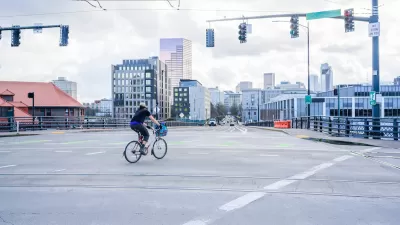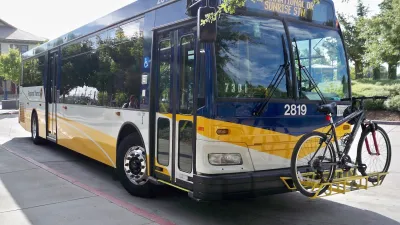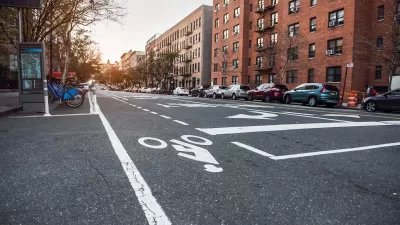As you may have heard in yesterday's Planetizen Podcast, Virginia Governor Tim Kaine doesn't like cul-de-sacs. Most news reports on the story have claimed that the state is "forbidding," "banning," or even "outlawing" the cul-de-sac. In fact, Virginia municipalities can still design, build, and approve any road patterns they wish, but the State will no longer agree to foot the bill for the ongoing maintenance of cul-de-sacs. The news item came up in a staff meeting yesterday and one colleague told us that a friend he was having dinner with declared the move "Un-American!"
As you may have heard in yesterday's Planetizen Podcast, Virginia Governor Tim Kaine doesn't like cul-de-sacs.
Most news reports on the story have claimed that the state is "forbidding," "banning," or even "outlawing" the cul-de-sac. In fact, Virginia municipalities can still design, build, and approve any road patterns they wish, but the State will no longer agree to foot the bill for the ongoing maintenance of cul-de-sacs. The news item came up in a staff meeting yesterday and one colleague told us that a friend he was having dinner with declared the move "Un-American!"
In a brilliant stroke of spin, Virginia is not posing the new legislation as a regulation that hinders individual or municipal liberties, but rather as a cost- and time-saving measure. By not having to send unwieldly maintenance and emergency vehicles up any future cul-de-sacs (or along the crowded arterials that carry every trip made from a cul-de-sac dominated subdivision), the state can respond faster to emergencies and save boku bucks on road maintenance.
My favorite news story on the subject is this one, mostly because the reporters talked to a lawyer for Biscuit Run, a hilariously named new development just outside of Charlottesville. Steven Blaine, an attorney for the Biscuit Run developer, fell into much of the same argument against cul-de-sacs that new and old urbanists alike have been using for years: "we
want to make it easy for people who live in the community to get from
one part of the community to the other." The brilliance of the Virginia arguments are that they are difficult to
oppose on a libertarian ground..."so, you want to have the liberty to
live on a cul-de-sac? Then, I assume you're also happy paying higher
taxes for the road maintenance and service, yes?" Tim Kaine makes the new urbanist arguments look somehow namby pamby, even while he accomplishes their objective.
If an editorial is more your style on this subject than a bland news article--even one about Biscuits and Running--than news, this commentary has some pretty funny hyperbole and a great accompanying photo. The author here captures my own annoyance at the opponents of this policy who claim that they prefer living on a cul-de-sac because _it's safer_. The Virginia Home Builders and others seem to believe that their children can frolick in the cul-de-sac without ever encountering danger. They forget about the social dangers of isolation and the health dangers of extraordinary commutes, but, as Tim Kaine points out, they're also forgetting about how much longer emergency rescue vehicles muct sit in traffic in a cul-de-sac-heavy road network.
Luckily for us, Roman Polanski has already made a farce of this "safety" notion with his 1966 film, Cul-de-Sac. I've never seen it, but it appears to be a pretty subversive sexual study of what happens when two criminals on the lam crash at a couple's beachfront mansion, at the end of...of course...a cul-de-sac. Nextflix queue, ho!

Alabama: Trump Terminates Settlements for Black Communities Harmed By Raw Sewage
Trump deemed the landmark civil rights agreement “illegal DEI and environmental justice policy.”

Planetizen Federal Action Tracker
A weekly monitor of how Trump’s orders and actions are impacting planners and planning in America.

The 120 Year Old Tiny Home Villages That Sheltered San Francisco’s Earthquake Refugees
More than a century ago, San Francisco mobilized to house thousands of residents displaced by the 1906 earthquake. Could their strategy offer a model for the present?

LA’s Tree Emergency Goes Beyond Vandalism
After a vandal destroyed dozens of downtown LA trees, Mayor Karen Bass vowed to replace them. Days later, she slashed the city’s tree budget.

Sacramento Leads Nation With Bus-Mounted Bike Lane Enforcement Cameras
The city is the first to use its bus-mounted traffic enforcement system to cite drivers who park or drive in bike lanes.

Seattle Voters Approve Social Housing Referendum
Voters approved a corporate tax to fund the city’s housing authority despite an opposition campaign funded by Amazon and Microsoft.
Urban Design for Planners 1: Software Tools
This six-course series explores essential urban design concepts using open source software and equips planners with the tools they need to participate fully in the urban design process.
Planning for Universal Design
Learn the tools for implementing Universal Design in planning regulations.
Ada County Highway District
Clanton & Associates, Inc.
Jessamine County Fiscal Court
Institute for Housing and Urban Development Studies (IHS)
City of Grandview
Harvard GSD Executive Education
Toledo-Lucas County Plan Commissions
Salt Lake City
NYU Wagner Graduate School of Public Service






























